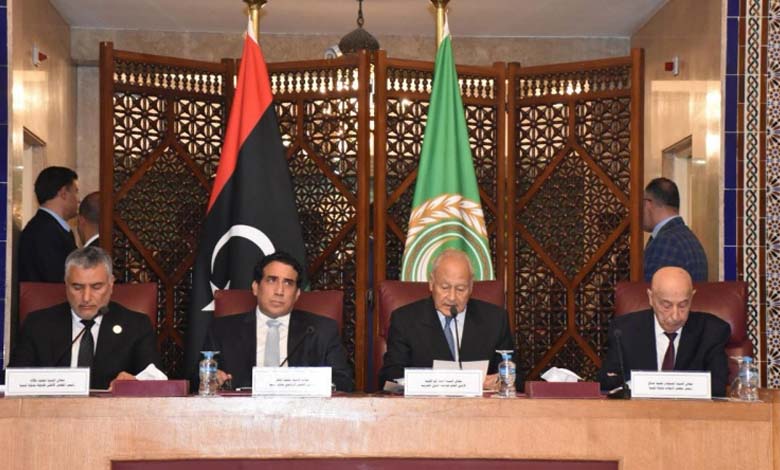Libyan Leaders Agree to Form a Unified Government… Have the Muslim Brotherhood Abandoned Dbeibeh?

The presidents of the legislative councils, the state, and the presidential council have agreed to form a unified government and a technical committee to review amendments to electoral laws.
This agreement was reached during a meeting in Cairo, under the auspices of the Arab League, between the presidents of the councils: President Mohamed al-Menfi, parliamentarian Aguila Saleh, and the Higher State Council dominated by the Muslim Brotherhood led by Muhammad al-Tekali.
The Arab League stated in a statement relayed by Anadolu agency: “In response to the invitation of its Secretary-General Ahmed Aboul Gheit, al-Menfi, Saleh, and al-Tekali met ‘to reconcile viewpoints and resolve points of disagreement regarding the organization of presidential and parliamentary elections’.”
“On the basis of the political agreement and its annexes, it was agreed to form a technical committee within a specified period to consider the necessary adjustments to broaden the base of consensus and accept the work done by the (6+6) committee and resolve outstanding issues in accordance with existing legislation.”
“They also agreed on ‘the necessity of forming a unified government tasked with overseeing the electoral process, providing necessary services to citizens, and unifying sovereign positions’.”
“They also agreed to ‘invite the UN mission to support Libya and the international community to support this consensus for its success’, and ‘to hold a second round (of the meeting) urgently to finalize this agreement and implement it’.”
Libyan circles did not expect the meeting called by the Arab League at its headquarters in Cairo to achieve a political breakthrough in the Libyan crisis, given its marginal role in recent years, and the predominance of roles of regional forces, international organizations, and other actors on the scene, according to Arab London.
Libyan sources in Cairo revealed that the Arab League will not be able to contribute actively to the crisis currently, but the participation of the president of the State Council and the absence of Dbeibeh indicate an attempt to attract the former towards the eastern camp, to which Aguila and Manfi belong, and to distance al-Tekali from Dbeibeh, one of his key allies in the political equation.
Conversely, sources suggested that al-Tekali, a member of the Muslim Brotherhood, attended the meeting on instruction from Dbeibeh to hinder agreements, and that matters will become clear in subsequent stages, away from the optimistic statements that appeared in the League’s statement.
In June 2023, the 6+6 committee, formed by the legislative and state councils, issued electoral laws to govern the upcoming elections, but some provisions faced opposition from some parties.
Al-Tekali, the Muslim Brotherhood leader, had previously rejected the electoral laws published by the parliament “after amendment” outside the agreement, calling for a return to the draft law agreed upon among the members of the 6+6 committee.
Libyans hope that the elections will put an end to the conflicts and divisions that have existed since early 2022, with two governments, one led by Osama al-Hadad and backed by the Parliament (East), and the other recognized by the United Nations and based in the capital Tripoli (West), the Government of National Unity led by Dbeibeh.












